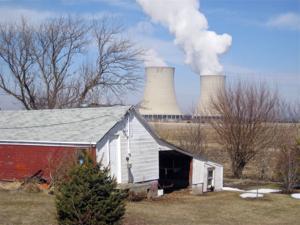Op-Ed: Lawmakers should say ‘no’ to subsidies for Exelon nuclear plants

As federal lawmakers deliberate over President Joe Biden’s $1 trillion plan to beef up American infrastructure, few might have noticed that the current plan also includes a $6 billion credit line for nuclear plants. While it can wait for another day to debate the question as to whether or not subsidizing certain forms of power generation is a responsible use of hard-earned taxpayer dollars, Americans of all stripes should be concerned that some of these funds in this credit line could go to prop up profitable nuclear plants that don’t appear to need help.
Such a question hits hard in Illinois, where electricity giant Exelon is in the midst of a desperate push to rake in public funding for its Byron and Dresden nuclear plants. The company has even convinced some residents, business owners, and school board members to lobby on its behalf to “save” its Byron nuclear plant. The problem? Not only have independent analyses shown the nuclear plants to be profitable, Exelon is also under intense legal scrutiny for corruption. Why would lawmakers on any level even consider rewarding the company with subsidies?
For starters, the two nuclear plants Exelon claims are struggling – Byron and Dresden – are actually operating at a profit. In fact, the Independent Market Monitor verified the profitability of the plants, finding that Byron is operating at a budget surplus of $77.5 million without subsidies and Dresden is operating at an annual budget surplus of $83.7 million also excluding subsidies. The Electric Power Supply Association, in fact, testified to the profitability of these plants in June of this year before the U.S. Senate Energy and Natural Resources Committee. What’s more, the Independent Market Monitor for PJM, the power grid operator for the area including parts of Illinois, has stated that not a single nuclear plant on the PJM system is at risk of retirement.
The fact that these plants don’t need public subsidies isn’t a matter of opinion, but fact. This point was driven home earlier this year by Illinois State Senate President Don Harmon, who pointed to independent economic analysis that proved without a doubt Exelon’s plants were economically viable and didn’t need public welfare to survive. “Independent market monitors believe these plants can be profitable,” Harmon said in a statement, directly contradicting the narrative Exelon has repeatedly foisted on lawmakers and the public.
Second, consider Exelon’s recent track record. The company was fined $200 million last year over bribery and corruption charges and is currently under a deferred prosecution agreement with the federal government. As if that weren’t enough of a stain on the company’s character, Illinois regulators are in the process of investigating whether Commonwealth Edison (ComEd) – a subsidiary of Exelon – charged its customers for any costs associated with this bribery scandal. The Illinois Commerce Commission (ICC) voted unanimously to launch the investigation following a staff report that recommended looking into whether ComEd saddled customers with costs “not properly recoverable.”
These actions reveal at least one instance of proven corruption and potentially a scheme to make customers pay for the bribery scandal. Should federal or state officials really hand more public dollars to Exelon?
Exelon thinks so, which is why the company is now seeking a bailout at the state level in Illinois and working feverishly to gather allies at the local level to give its cause a homegrown flavor. They hope that lawmakers and the public will overlook its recent scandal and the overwhelming evidence that its Byron and Dresden nuclear plants don’t even need the money they’re asking for. That’s a bold strategy to say the least, but one that sensible minds in Illinois couldn’t possibly endorse.
Exelon’s poor-mouthing might fool some, but the company’s story simply doesn’t hold up to the light of truth. Its nuclear plants aren’t struggling to stay alive. They’re profitable and independent analysis shows it. Those plants don’t need $6 billion in new federal subsidies or a bailout at the state level funded by the hardworking families and businesses of Illinois.
Even if the plants did need financial assistance, should lawmakers really hand over vast sums of public dollars to a company that has engaged chronically in crony capitalism and corruption and which is now under a deferred prosecution agreement with the federal government? Of course not.
It’s time to end the gamesmanship over the Byron and Dresden nuclear plants and let the truth prevail. The stakes are too high for the public’s hard-earned money. Let’s insist that lawmakers don’t subsidize profitable and corrupt public utilities.
Disclaimer: This content is distributed by The Center Square

